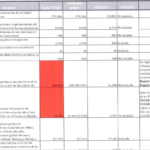1.5K
Mohloai Mpesi
PROMINENT business tycoon and pastor, Thakadu David Ramela, widely known as Bishop Ramela, has been controversially awarded a lucrative fertilizer tender despite his price being double the cost of other bidders for the supply of the Top-Dressing Type I fertilizer.
His company, Ramela and Associates, has been awarded the M10,119,265 million contract using the selective tendering method, a move that has raised eyebrows.
Selective tenders – instead of open public bidding processes – are always controversial.
Mr Ramela’s bid was nearly double those of the other four competing companies causing some of them to cry foul.
The competing bids were: Seahlolo sa Lihoai with a M4 942 350 bidding price, Matebele Trading which tendered for M5 800 850, Greenland Farm Suppliers whose bid was priced at M4 856 350 and BGM which cost M5 635 000.
Other unhappy tenderers now suggest that Mr Ramela may have been awarded the lucrative contract due to his alleged connections with the ruling Revolution for Prosperity (RFP) party.
However, Mr Ramela has strongly denied these claims, insisting that his company was not actually awarded the tender. His denial is in sharp contrast to available evidence.
A letter seen by the Lesotho Times, addressed to one of the unsuccessful companies, confirms that he was in fact awarded the project.
The letter shows Ramela and Associates and Greenland Farm Suppliers as the successful bidders.
The letter, signed by Principal Secretary (PS) Thabo Moleko on 29 October 2024, was titled “Tender for Supply and Delivery of Fertilizers (Top Dressing).”
It informed an unsuccessful bidder that, after a careful evaluation of all tenders received, Ramela and Associates, along with Greenland Farm Suppliers, owned by another controversial businessman Mpho Sekonyela, were selected for the project.
The letter also invited the unsuccessful bidder to exercise their right to object within the government’s designated “cooling-off” period, a standard practice aimed at ensuring transparency in the awarding of public contracts.
“All tenders received have been carefully evaluated and a decision reached. I regret to inform you that on this occasion you have been unsuccessful,” the letter reads.
“I would like to reassure you that the decision not to accept your tender in this case will not affect you being considered for other contracts.
“The successful tenders for supply of fertilizers are: Ramela and Associates with Black Urea and Greenland Farm Suppliers with Supperfeed Calcium Chloride. Multifeed not awarded due to high prices and Top-Dressing type I not awarded because of wrong specification (sic).”
PS Moleko also encouraged the unsuccessful bidders to submit any objections, stating that, should any challenge present a “prima facie case” of wrongdoing, the contract award would be halted pending resolution.
“Once the ‘cooling-off’ period has lapsed, and if no objections have been received by this office or by the Procurement Tribunal or if objections have been received and they have been resolved to the satisfaction of the objectors, the contract will be awarded to the most favourable tenderers.”
Despite this evidence, Mr Ramela denied that his company had won the tender, asserting that the contract was cancelled before it was awarded.
“The pricing is determined by the tonnage required, not because my bid was more expensive. The contract didn’t even materialise; it was cancelled long before any of this circulated on social media,” he said, adding that his pricing was in line with the quantities stipulated in the contract.
When asked whether his much talked about relationship with Prime Minister Sam Matekane might have influenced the contract award, Mr Ramela dismissed any personal connection with the PM. He explained that he regularly hosts events in his hometown of Mahobong, open to various political and royal figures, and that while he invites everyone, this should not be mistaken for close ties.
“People claim things about me that aren’t true. I invite everyone, including their Majesties, to my annual celebrations, but this year Prime Minister Matekane didn’t attend. My events are open to all, regardless of political affiliations, and I have no special relationship with Mr Matekane,” he explained.
Mr Ramela also said he had a history of assisting governments, citing such support during the tenure of former Prime Minister Moeketsi Majoro.
“I stepped in to help during Dr Majoro’s government when they struggled to afford fertilizers due to budget constraints. But I have not provided any assistance to the current administration under Mr Matekane,” he said.
For his part, PS Moleko disputed the claims regarding inflated prices, asserting that the figures being circulated were fictitious. He explained that the bidding process took into account legal compliance, tax registration, and other criteria in addition to the financial proposal.
“Each company is required to meet specific criteria to ensure suitability, and the tender committee reviews bids to confirm financial soundness, technical compliance, and other factors before scoring each proposal,” he said.
Mr Moleko said he was aware of the high figures being alleged but insisted that they were not accurate. He said the ministry held the actual details and figures of the tender but said these would only be shared with a legitimate investigative authority.
“I want to be clear that these figures are not factual. The procurement details are sensitive, and any information we have can only be disclosed to an authorised investigative body,” Mr Moleko insisted.
According to Mr Moleko, the actual bid amounts differed from those being alleged.
“Yes, Ramela and Associates could have been considered, but not with the M10 million amount being claimed. That’s a complete fabrication,” he said.
When asked if he could clarify with factual details, Moleko maintained that the information was confidential and not available for public release. He stated that any investigation by a legally mandated body would receive full cooperation from the ministry.
However, the Lesotho Times was reliably issued with the tender figures by losing bidders who attended the official debriefing session at which names of bidders and their quoted costs are disclosed.
“Even though there is no law that binds the government to consider the lowest bid, there must nonetheless be cogent reasons of accepting a ridiculously higher bid such as this one…,” one of the losing bidders said on condition of anonymity for fear of victimisation.
“In this case, there are no such reasons…. It is only rational that an average or lower figure must have been preferred. We were called to submit bids because they know we are experienced in this field so we fail to understand how a company that submitted such a high figure, compared to ours, would get the job.”
Meanwhile, the agriculture ministry issued a notice on Saturday suspending the sale of fertilizers at the government’s facilities across the country due to unavailability of stock. The ministry said it would notify farmers when fertilizers are available. It would seem this could be the reason why the ministry opted for a selective tendering process to get stock urgently. It nonetheless raises questions of poor planning as the government knew well ahead of season that it would require fertilizers.
Mr Moleko’s contention that he would only release Mr Ramela’s bid price to a competent investigative authority also flies in the face of the RFP government’s pledge to run a transparent government.
It is incomprehensible why costs of tenders financed by public funds should be kept confidential. In most transparent jurisdictions, the costs of tenders and the tenderers in publicly funded projects are publicly advertised after they have been awarded.
In fact, details of all public tenders should be public information in any government that wants to foster transparency. The RFP led government’s handling of tenders – especially its preference of the selective tendering method – is emerging as a sore point among those who had hoped it would do things differently and work towards eliminating rampant corruption in the public sector.
Selective tendering is always a fraught process as it limits the scope of participation to those “selected” to submit bids instead of open public tender processes.
The Lesotho Times reported last week that Public Works and Transport Minister Matjato Moteane’s ex-company – Khatleli Tomane Architects – had scored a portion of a M100 million tender for the rehabilitation of the Moshoeshoe 1 International Airport.
But Mr Moteane said he was not involved in the award of that tender within his own ministry. He also said he had long quit Khatleli Tomane Architects, upon joining government and sold off his shares. His contention has done little to mollify critics who now view the RFP’s contention that it came into government to serve Basotho only, because most of its founders were already rich people, as nothing but a smokescreen.














